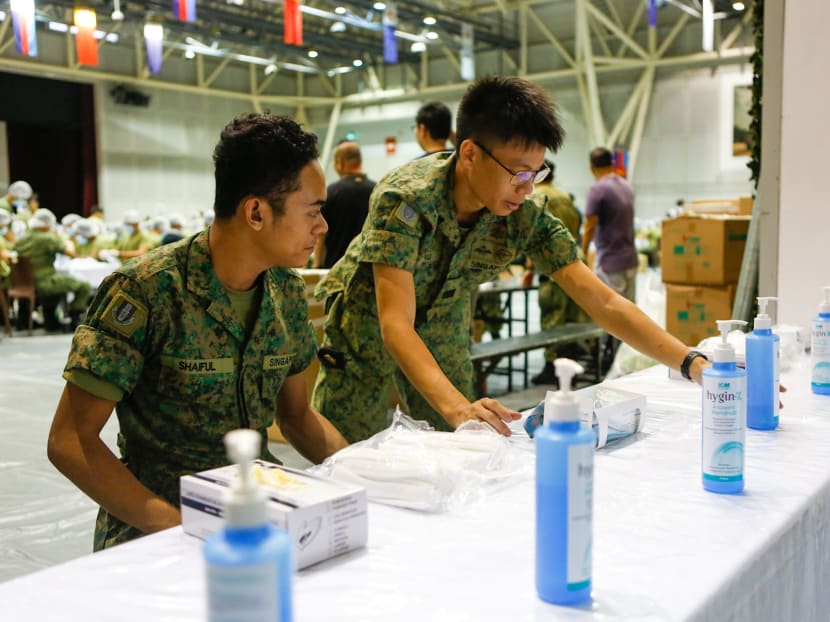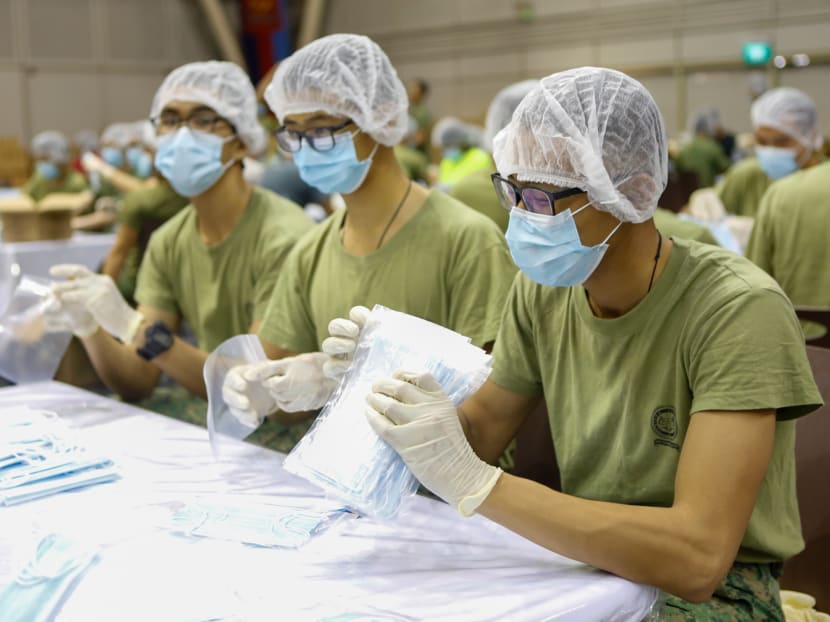SAF personnel packing masks, doing contact tracing, supporting fight against Wuhan coronavirus
SINGAPORE — The Singapore Armed Forces (SAF) is getting involved in the fight against the Wuhan coronavirus, mobilising its personnel to pack 5.2 million surgical masks for households here, monitor passengers at the airport and make calls for contact tracing.
SINGAPORE — The Singapore Armed Forces (SAF) is getting involved in the fight against the Wuhan coronavirus, mobilising its personnel to pack 5.2 million surgical masks for households here, monitor passengers at the airport and make calls for contact tracing.
Defence Minister Ng Eng Hen said on Friday (Jan 31) that the army is supporting the disease containment and prevention efforts, while retaining enough of its manpower and resources to continue to meet its primary defence responsibilities.
“Even though it’s a national task, a national effort, we want to make sure the SAF keeps its eye on its primary area of responsibility… we will not compromise security even though this is important,” Dr Ng said.
He was speaking to the media during a visit to Safti Military Institute, where he observed SAF personnel pack surgical masks for distribution to 1.3 million households. Each household is to get 4 masks and the packing has to be done fast because distribution starts on Saturday afternoon to Feb 9.
About 1,500 personnel from the SAF's Combat Service Support Command were mobilised for this exercise, and the packers include a mix of full-time national servicemen, regulars and civilians.

They work in shifts of eight hours round the clock, with the first shift beginning at 10pm on Thursday and 450 personnel managed to put together 200,000 packs of masks then.
At the Safti Military Institute on Friday afternoon, SAF personnel sat in rows along tables as they methodically put together packs of masks, before placing them into cardboard cartons holding 400 packs of masks each.
The masks will be handed to the People’s Association to deliver to 89 community centres (CCs) and 654 Residents’ Committee (RC) centres around the island progressively for collection by residents. SAF aims to deliver its first batch of at least 300,000 packs of masks by the end of Friday.
The public may start collecting the masks from 2pm on Feb 1 at selected CCs and RC centres. Over the week, the masks will be available at more CCs and RC centres in public and private housing estates.
TODAY has reached out to the People's Association to ask which are the CCs and RC centres that will receive the first batch of masks.
The coronavirus outbreak began late last year in Wuhan, the capital city of Hubei province in China.
The virus is believed to have jumped from wild animals at a wet market there to humans, and is from the same family as the pathogen that caused the Middle East respiratory syndrome (Mers), as well as the severe acute respiratory syndrome (Sars) outbreak which killed almost 800 people worldwide from 2002 to 2003, including 33 in Singapore.
Singapore has 16 imported cases of the new coronavirus as of Friday night and the patients, including one Singaporean, all came from Wuhan. They are isolated and being treated.
Contact tracing for these confirmed cases is ongoing, and as a precautionary measure, contacts will be quarantined for two weeks from their last exposure to the patient.
All other identified contacts who have a low risk of being infected will be under active surveillance and will be contacted daily to monitor their health status.
As of midday on Friday, the Ministry of Health has identified 202 close contacts. Of the 162 who are still in Singapore, 156 have been contacted and are being quarantined or isolated, while the remaining six are being traced.
Dr Ng said: “All of us are hoping we can prevent community spread. That’s the most important. A lot of that work will have to be contact tracing and the SAF was mobilised to help with that.
“They’ve been making about a few 100 phone calls a day trying to (contact) Hubei residents and asking how they are through phone.
”We’ve also been involved in airport surveillance of arrivals. Our SAF boys are manning the thermal imagery to pick up passengers with fever.
“They are not in direct contact or even near passengers. They are not meant to be and they are not trained in that. But if they detect people with a fever or those with flu-like symptoms, they will alert airport staff as well as medical staff to deal with it.”
When asked if there were any SAF personnel in China at the moment and their status, Dr Ng said that SAF has instructed its servicemen not to travel to China for “non-essential aspects”.
He added that servicemen will have to get clearance before travelling for important engagements to China.
For National Service, Dr Ng said that SAF had deferred the enlistment of new recruits who have travelled to China recently until they complete a mandatory 14-day leave of absence.
Likewise, in-camp training or other duties will be deferred for operationally ready national servicemen who have travelled to China recently.
On whether bilateral exercises with China will be affected by the viral outbreak, Dr Ng said that there are no upcoming exercises and this “has not been an issue”.












